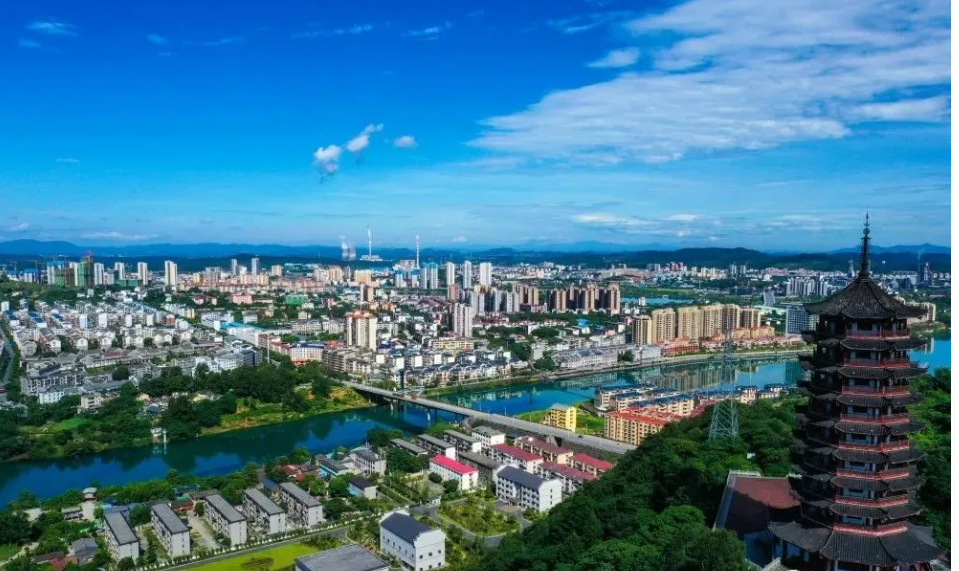Zixing paves the way toward rural revitalization
2023-05-11
In recent years, based on regional resource advantages, Zixing City of Chenzhou City has adjusted the industrial structure in light of its actual conditions, improved primary-level governance and enhanced the rural living environment, contributing to upgraded agricultural industry, increased farmers’ income, beautiful village construction and improved rural civility.

After the Qingming Festival, the tea trees on the tea mountain of Tangxi Town in Zixing City grow greener, sprouting numerous new young shoots. It’s now the peak season for local villagers to pick tea leaves in the tea gardens.
On April 24, at dawn, Chen Licheng, a farmer from Shang’ao Village of Tangxi Town, led some tea-pickers to pick tea leaves in his over 100 mu (about 6.67 hectares) tea garden. He said that apart from processing his own tea leaves, he also bought fresh tea leaves from local farmers for processing in his factory. At present, 1,500 kg of fresh leaves are picked and purchased, and 300 kg of dried tea is processed in his factory every day. The workers earn more than 200 yuan a day.
The planting area of tea in Tangxi Town covers 32,000 mu (about 2,133.33 hectares) with an annual output of 950 tons of dried tea and an annual comprehensive output value of 360 million yuan. The town was listed as a national demonstration town for “one village, a product” and a strong agricultural town in Hunan province. Gounaogong Tea Industry Co. Ltd. is the only key national leading enterprise in agricultural industrialization in the town.
Zixing City insists on taking industrial revitalization as the focus of promoting comprehensive rural revitalization, and has introduced a series of policies. Every year, more than 100 million yuan is invested to support base construction, brand building, construction of industrial parks and cultivation of leading enterprises. It has built four characteristic leading industries of “fish, fruit, tea and vegetables” in Dongjiang Lake with a total output value of 4.81 billion yuan. There are 15 new “vegetable basket” production bases for the Guangdong-Hong Kong-Macao Greater Bay Area and six high-quality agricultural products certified as green food, organic produce and GI products.
The rural living environment has also been improved as the industries are expanding and villagers’ income is increasing. When it comes to the changes in the village, villagers all praised the cleaner environment and better life. These changes are ascribed to the efforts made by Zixing city to improve the rural living environment in recent years.
So far, the city has built 189 rural revitalization projects worth 63.45 million yuan, demolished 107,000 square meters of dilapidated houses, completed the renovation of 600 toilets, and built seven rural public toilets.
In order to realize effective village governance, the village has established and improved the four working mechanisms, including the villagers’ meeting, the morality review meeting, the good people’s association and the public security cooperation association, to guide the masses to actively participate in village affairs.
Nowadays, the social etiquette and civility of Zixing City’s villages have been greatly improved, with good social order, neighbors helping each other, and families living in harmony. At present, the city has 16 rural revitalization model villages at provincial level, 10 beautiful village model villages at provincial level, 21 Chenzhou’s beautiful model villages at city level, and 86 beautiful model villages at county level.
Zixing City has strengthened the training of talents for rural vitalization, implemented the cultivation plan of high-caliber farmers and the “leading goose” project for leaders of rural industry revitalization, and made every effort to attract and cultivate all kinds of talent to give full play to their talent in the vast countryside.
Last year, the city introduced high-quality talent from universities across the country for 23 main positions in the government. Public institutions also launched recruitment of professionals in water conservancy, agricultural technology and rural construction planning. The city also selected 101 technicians to provide services in the countryside. 263 businessmen were attracted to start their businesses in their hometowns.




